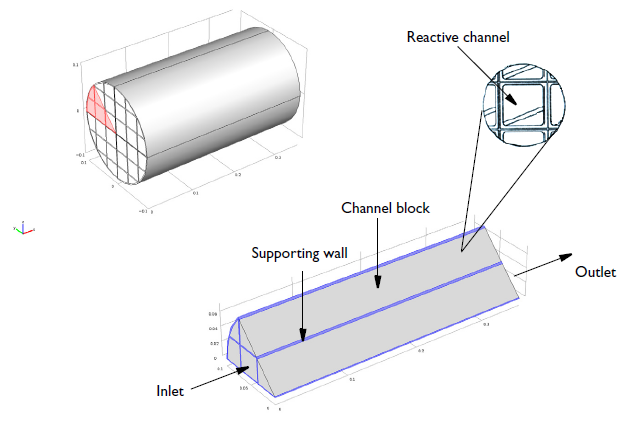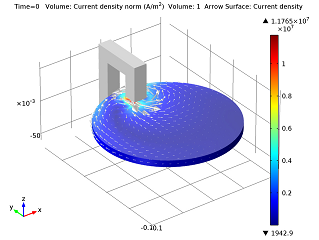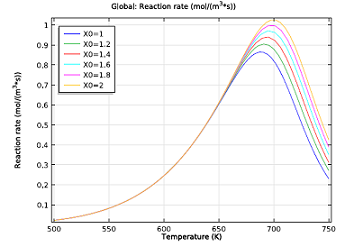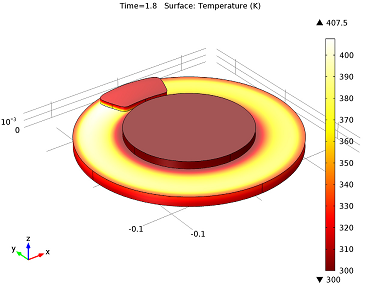Latest Posts

Modeling Chemical Reactions: 3D Model of a Monolith Reactor
In a previous blog post we dealt with the reaction kinetics and modeled plug flow of a monolithic reactor in the exhaust system of a car. The goal was to determine the ideal dosage of ammonia to reduce the nitrogen oxide levels emitted into the air. After understanding the chemistry of our problem, it is now time for the second part in our “Modeling Chemical Reactions” blog series. Here, we will go through the steps of generating a 3D model […]

Simulating Eddy Current Brakes
Last week you saw how you can simulate the heating of a car’s brake discs. This reminded me of another type of brake — the eddy current brake (also known as magnetic brake). Whereas the other model was a study in heat transfer, eddy current brakes deal with electromagnetics.

Modeling Chemical Reactions: Kinetics
In chemical reaction engineering, simulations are useful for investigating and optimizing a particular reaction process or system. Modeling chemical reactions helps engineers virtually understand the chemistry, optimal size and design of the system, and how it interacts with other physics that may come into play. This is the first of a series of blog posts on chemical reaction engineering, and here we will have a look at the initial stages of modeling the application: the chemical reaction kinetics.

Introduction to COMSOL Multiphysics, a Book to Get you Started
What does it take to get started using COMSOL Multiphysics? Of course, it depends on where you set the bar. However, grasping the workflow and handling the basic tools can be relatively easy to pick up. To make this process even smoother, first-time users will benefit from the recent major update of the COMSOL Multiphysics instruction manual. The book, Introduction to COMSOL Multiphysics, is a valuable tool for learning COMSOL simulation software and the new version is now available for […]

Simulating Heating of Brake Discs in a Car
Cars need brakes for obvious reasons, and you don’t want these to fail. Brake failure can be caused by many things, one of which is the overheating of the brake’s disc. As I’ve said before, no engineer wants to design a product that fails, which is also true in the case of brake-disc design. Let’s study a scenario of a car in panic brake mode, and find out how hot the brake discs and pads get as well as how […]

Metamaterials Make Physics Seem Like Magic
Metamaterials are a new and emerging technology with vast potential to reshape our views on what is and isn’t possible in this physical world of ours. Unlocking the mysteries and overcoming the obstacles associated with metamaterials would lead to a host of technological advances once thought impossible by even the most imaginative of individuals. From making computer chips smaller and faster than the most advanced current ones, to protecting structures from earthquakes, to developing imaging technology that doesn’t harm tissue […]

When Marshmallows Become Rock-hard
A while back, I bought a bag of marshmallows, indulged a bit, and then forgot about the opened bag for a few weeks. To my surprise, and disappointment, when my marshmallows cravings returned the top ones were rock-hard while the bottom ones were almost as soft as when I bought them. Why was this the case? By leaving the bag open, water had migrated from the marshmallows into the air.

Electrical: The Bumblebee Electrifies Anyway
“The Bumblebee Flies Anyway” was a book by Robert Cormier that I read as a young teenager. In it, Cormier describes how bumblebees are natural anomalies as they seemingly do not have the aerodynamic capability to actually fly. Their wing span and flapping speed should not provide enough lift to allow flying, and this is a fact that I have always associated with bumblebees since. Yet, this has been proven not to be true, as a closer investigation of the […]
